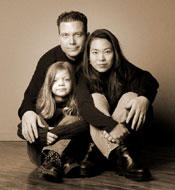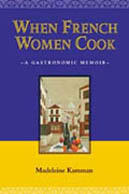Doubts about MyBookYourBook
In today's blog
Doubts about My BookYour Book
More French food
Life's embarrassing moments
Homo tabloidus
Women's wicked wit
Quotations
Celia Brayfield
Doubts about My BookYour Book
After reading a piece in the UK Daily Telegraph on Monday headed 'Online library's novel attraction for bookworms', I went to look at the website.
Among the first to join the service, the Telegraph told us, was Jackie Barrett, 64, from Bromley, Kent. 'I am a book addict and own more than 1,000 books. I think this will stop books going to waste, because they are so cheap now that they are bought, read and then fester on shelves.'
Fester? What can she mean? To me, there's no more pleasing sight than a wall of books. Houses which lack this feature are never as homely as those where every room has some bookshelves, the more the better.

Bookcrossing, brainchild of Ron Hornbaker, seen here with his wife Kaori and their daughter, has been extremely successful. But, without wishing to be a wet blanket, I can't see MyBookYourBook achieving the same popularity.
I don't know about your town, but the town I'm in at the moment is awash with second hand books at low prices. Why should anyone want to put themselves to the trouble of mailing books to strangers?
Also the MyBookYourBook rules are quite complex.
All books provided by the member on first registration and on renewal must be in paperback form only and, from the calendar year of first registering as a member:
1. two or more of the books must have a year of first publication that is within the last 5 years and;
2. unless ten books are provided in category (a) then three or more of the remaining books must have a year of first publication that is within the last 6 to 10 years and;
3. unless ten books are provided under categories (a) and (b) then three or more of the remaining books must have a year of first publication that is within the last 11 to 20 years and;
4. the remaining books not provided under (a), (b) or (c) can have a year of first publication that is within the last 21 to 50 years.
Can you get your head round that without resorting to pencil and paper? I can't.
More French food
On Wednesday, having written about a copy borrowed from the public library in last Sunday's blog, I spent £12 at Buttons Bookshop in St Peter Port on a copy-to-keep of French Women Don't Get Fat.
On Thursday, the Common Reader newsletter dropped into my Inbox offering When French Women Cook, A Gastronomic Memoir by Madeleine Kamman. This was what the newsletter writer had to say about it.

I've always had a fondness for books in which writers celebrate the relatives and acquaintances, mentors and masters who fanned the sparks of their early enthusiasms. This wonderful volume, although written by a cook, is filled with the same sort of affection, nostalgia, and gratitude. In eight chapters, Madeleine Kamman celebrates the women (from her great-grandmother Marie-Charlotte to Magaly Fabre, matriarch of a wine domain) from whom she received, and with whom she has shared, the blessing of her vocation. Happily for the reader, each of the eight women profiled represents a different area of France, allowing Kamman to survey her native cuisine from Normandy to Provence. This is a book not only about food — although it is packed with recipes — but about one woman's respect for the culture that nurtured her: “a civilization that was human, tender, enjoyable and lovable.”
Life's embarrassing moments
Early last Sunday morning I emailed Denis Dutton – 'I hope you won't mind my using your photo in today's Bookworm on the Net blog.'
To which he replied –' Thanks, but that handsome chap is Charles Murray, the guy who wrote Human Accomplishment. I attach me.'
Whenever I do something stupid, I remember Alfred Jenner, the Chief Sub on my first daily paper, who, when I was summoned to his presence, could make me feel that a firing squad would be preferable to a dressing-down from him.
My recent mistake came about because, although I had seen a picture of Professor Dutton once before, it was several years ago and when, on his website, I saw a photo of a man with friendly eyes and a good chin, I assumed it must be DD.
Years later, I can still hear Alfred Jenner's outraged snarl. 'You assumed? You had no business to assume. Reliable reporters never assume anything. They check their facts. If this ever happens again…' With a contemptuous wave of his hand I would be dismissed, cringing.
[In fairness, I must add that when he was in a benign mood, Alf, as his equals called him, was a 22 carat charmer. The occasional chance to sit at the same table in the staff canteen and listen to him chatting to a fellow sub or one of the senior reporters was a major treat.]
Having deleted the photograph of Charles Murray and replaced it with the photo kindly supplied by Professor Dutton – hoping that, as it was still early, nobody would have read the blog yet – I then emailed him again.
'Humble apologies for my stupid mistake. And thank you for supplying correct photo. All is well now...I hope! Deeply embarrassed!'
To which he replied – 'Funny, but last week somebody thought Christopher Booker was me. I've remedied the situation, as you'll see by looking at the page.'
The remedy being to put a caption on the photograph of Mr Booker.
Commenting on my comment last Sunday that the only two vital qualities in a prospective husband were kindness and a sense of humour, Denis Dutton wrote – 'The point is not what makes happy marriages long term, but what tends to influence initial mate-choice. I stick by the list for that, though I agree that it does not make for long-term durability. Your two values are VERY important on the psychologists' lists.'
In view of his massive work-load, I felt it was exceptionally kind of DD to help me extricate myself from an error I should never have made. The trouble with blogging is that the text is not scrutinised by a hawk-eyed editor before it goes public. During my years with The Bookseller, one excellent editor was succeeded by another equally good editor so that, although I always tried to make my "copy" as perfect as possible, I could rely on any error I had missed being spotted and queried before it appeared in print.
Homo tabloidus
In an article on Art and Sexual Selection Denis Dutton has coined the term homo tabloidus used thus –
Thanks to sexual selection, we ended up with big brains that are hungry for news and gossip, religion, urban myths, political ideas, wishful thinking and pseudoscience. We like such information, but we’re not very good at fact checking.
This may be a fair description of a considerable slice of humanity, call it homo tabloidus, but what about legitimate science? How did it manage to carve such an important place for itself in this welter of flashy fiction and seductive superstition?
Women's Wicked Wit
Library book borrowing in the UK is in serious decline, we are told.
A sight I love to see, when approaching the check out at the Guille-Allès public library in St Peter Port, is a parent, accompanied by one or more children, waiting for a stack of books to be date-stamped. Sometimes, to save borrowers with only a few books having to wait, the member of staff on duty at the nearby enquiry desk, will offer to stamp their books. As I'm not pressed for time like many library users, I never mind waiting and thinking how lucky the children are to be growing up in a household where books are an essential part of everyday life.
There are exceptions to every rule and I'm sure there have been some nasty, even criminal bookworms. But, generally speaking, there's a good chance that a child raised to love reading will become a well-adjusted, law-abiding, useful adult, while a child deprived of books will be more likely to develop bad habits and be a nuisance to everyone.
Read Why Kids Behind Bars Turn to Books, and there's an interesting piece by David Isaacson, Assistant Head of Reference and Humanities Librarian, Waldo Library, Western Michigan University, Kalamazoo, in which he writes –
I'm not inviting people to steal books from our shelves. But I wish more academic as well as public libraries had a section of used books they no longer needed advertised with a sign that said "take one, leave one," or "take one of these home with you to keep; consider borrowing one of our other books." Most of the books in our semiannual book sales, for example, aren't needed in our collections. There are hundreds of books left over from each sale that, sad to say, go to the dumpster. These should be put on a table as freebies. Some homeless people eat food from dumpsters. But very few impecunious book-hungry people look for free books there. I also think we should take a more forgiving attitude toward some book thieves.

On a recent visit to the Guille-Allès, my eye was caught by a painting of a woman with a long neck and a ermine stole on the cover of Michelle Lovric's book More Women's Wicked Wit. At the bottom of the jacket I read "Featuring over 2000 quotations from Mary Shelley to Courtney Love."
Why the author or her publisher chose to name those two on the cover is a puzzle because a quick skim through the index suggests that Fran Lebowitz, Caitlin Thomas and Fay Weldon are three of the most-quoted women in this collection. Surely their names have far more pulling power than Shelley and Love?
Here are the three quotes which made me want to read more.
When I was forty, I used to wonder what people thought of me. Now I wonder what I think of them. Brooke Astor at ninety-two.
I absolutely love it that the Queen has no idea who Madonna is. India Knight
The cure for boredom is curiosity. There is no cure for curiosity. Ellen Parr
Catching up with Celia Brayfield
Last week I wrote a little bit about this author and showed the jacket of her book Deep France. Celia tells me it was quite a problem finding a picture of an authentic Bearniase roof. Here's the book's blurb.
This remote and beautiful corner of France is 'pioneer' country for the British, but that is changing. Last year, half of the properties sold in the nearby town of Salies de Béarn went to British buyers. Brayfield recognises that 'deep France' is as much a state of mind as a geographical reality and captures the conundrum facing 'cultural migrants': that by following their dream, they risk killing or, at the very least, changing forever the very thing they go in search of.
Rummaging around for more about Celia, I came upon -
Celia Brayfield is the author of nine novels including Wild Weekend, Mister Fabulous And Friends, Heartswap and the international bestseller, Pearls, as well as a non-fiction guide to storytelling in popular fiction, Bestseller. She was born in north London and was educated at St Paul's Girls' School and Grenoble University. Before becoming a full-time novelist, she wrote for the Evening Standard and The Times. She has one daughter, with whom she now lives in west London
Plus some Amazon reviews
Ron bracey, Consultant Clinical Psychologist - Celia Brayfield does for middle-aged men what Bridget Jones did for thirtysomething women
and
Duncan Gould, Consultant, The WellMan Clinic - A glorious portrait of middle class suburban life of our times and worryingly close to the truth - superb.
and
A reader from nz - I haven't laughed so much in ages.........wish I had read this book 20 years ago and learnt from it!!!!
My copy of Celia's book Bestseller was bought as soon as it came out and sits alongside Carole Blake's From Pitch to Publication. Both are required reading for all writers. Mr Fabulous was borrowed from the library. There were parts I enjoyed e.g. when Mo, a dealer, found some faux bamboo chairs in a French flea market. Otherwise it was hard to identify with the inhabitants of Westwick, Celia's imaginary London suburb. Not because they aren't well-written characters but because their lives and outlooks are so different from mine.
Celia tells me – 'At the moment I'm working with a director, Caroline Sax, and production company, Festival Films, to develop Mr Fab as a series for the BBC. I resigned from the National Academy of Writing about 2 years ago, and the last I heard they were in talks with the University of Central England about developing a course with them. From next year, I'll be a visiting lecturer at St Mary's College in the University of Surrey, and running some workshops in locally in West London. Mr Fab seems to have hit the spot in Chiswick anyway - I recently gave a talk on it as part of the annual festival and our local vicar, no less, insisted on billing it as "the Desperate Housewives" of Bedford Park."
Coming next Sunday, probably
Karin Slaughter's thrillers
Opening a parcel from Bibliophile Books
More on the value of famous people's letters
Advice from a New York literary agent
Arabella [Does My Bum Look Big In This?] Weir
Fifth edition of Who Else Writes Like…?
If you wish to respond to any part of today's blog, you can hit the comment button or email me direct.
